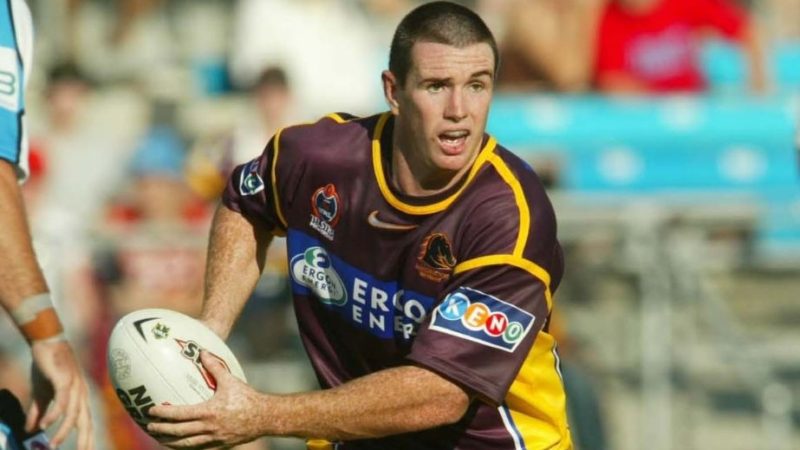031 – Ben Ikin (Part 2) – Life, League and Leadership
Host of NRL 360 & Former Origin Player

This is Part 2 of the Ben Ikin story. If you haven’t listened to Part 1 yet, I suggest you head back there and have a listen before you dive into this one. It’s not as though this part won’t make sense without it – it’s that Ben Ikin’s is a fabulous story. You won’t want to miss a second.
Episode Description
Ben Ikin is the youngest person to ever play State of Origin. He played rugby league for Australia and won a premiership with the Brisbane Broncos. And these days he hosts Foxtel’s NRL 360.
As impressive as all of those achievements are, it’s his thoughtful, reflective nature and his ability to extract lessons about life and leadership from his experiences that is most valuable.
Ben is a deep thinker about the game, about leadership and his life-long pursuit of excellence.
This is the first instalment of a 2-part episode. It’s filled with stories about the biggest names in sport, the characters Ben played with and worked with. You don’t want to miss it.
Topics
Part 1 (7 July)
- Playing – the early days
- The Origin experience
- Seagulls, Bears and Broncos
- Wayne Bennett
- Coaching – qualities and pressure
Part 2 (13 July)
- Marrying the coach’s daughter
- Career’s end
- Transition to the media
- Leadership
- Paul Kent
- Fatty and a player’s legacy
- Queensland Origin dominance – lessons learned
Lessons Learned
Here’s what I took from the 2-part episode:
Origin
When you are handed your Queensland jersey each year, the message that goes with it is simple and powerful, ‘It’s your watch’
Leadership
In the 1995 Origin series – Ben’s first – he learned that Paul Vaulting, like other great leaders was very clear about his strengths and weaknesses. He was not a tactical genius, but he understood that and didn’t try to be. He just concentrated on executing his strengths well – he was a great orator. He’s played origin, he understood what it took to win Origin games. He had a vision.
Corey Parker, in reference to Queensland’s recent Origin success, defined giving 110% – give your all doing your job and then help your mate do theirs
Leadership is not only the domain of the coach and the captain. In the 1995 Origin squad ‘there was any number of leaders who embodied what playing for Queensland was all about’.
Ben was (a very small) part of a player’s coup at the North Sydney Bears that moved to have their coach sacked. He is not proud of that time but stands by the sentiment that ‘you get nowhere in life unless you’re prepared to have the tough conversation’
When you start to question yourself, and if you don’t have a strong sense of self, you start looking for excuses and for people to blame
Players will loose confidence in a coach when they start to think that he cares more about himself than the players. When he starts to frame criticism with ‘you are letting me down’ rather than ‘you are letting the team down’
After his football career, Ben has found the corporate world, including the media, to be a feedback vacuum. The thing that is often missed in leadership in the corporate world is feedback and coaching
‘A leader is no more than the sum total of the efforts of their people’
Wayne Bennett
The reason, according to Ben, that Wayne Bennett is the most talked about figure in Australian sport is because he is a winner.
When assessing the performance of a coach we don’t work from the ground up, we work from results backwards.
‘If Wayne Bennett had coached exactly the same way for the last 30 years but only won 1 premiership (rather than 7), we wouldn’t be talking about him. That’s just the truth about professional sport’.
The great unspoken quality of Wayne is that he has authentic empathy. He genuinely cares for people. Everything he does in his work day has the foundation of ‘I want what’s best for you’ – and it’s real. So when he asks his players go above and beyond, they are likely to give back
Empathy is the one thing that is innate in all the great coaches
Wayne lives the example that he wants to see in his players
Team Environment
Celebrating success is an important part of achieving in a team environment. But there is a line that can be crossed where the focus moves away from making the small, daily choices that brought you success in the first place. A couple of times through his career Ben was guilty of slipping into ‘professional celebrator’ mode
When Ben moved to the Broncos he noticed a tangible difference in the way they trained and prepared. They worked really hard – but they knew how to have a good time. There was a lot of competition in the way they trained – trying to out-do each other, small competitive games. There was the right balance of characters, leaders, in the club who crafted the environment. They found a perfect balance between pleasure and purpose.
Share this:





